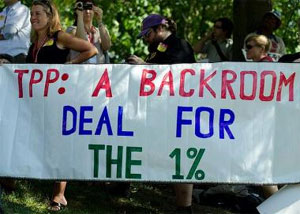by Rona Fried
After the Senate passed Fast-Track legislation, the House is next and the vote could come any day now. About a dozen Democrats hang in the balance and I’m not sure how many Republicans – but the vote will be close.
As a reminder, the US is the only country in the Trans-Pacific Partnership (TPP) that is pushing for fast-track – which gives Congress an up or down vote on the completed deal, with no ability to amend it.

This week, a panel of United Nations experts expressed grave doubts these secret international "trade" agreements pose to human rights.
"Our concerns relate to the rights to life, food, water and sanitation, health, housing, education, science and culture, improved labor standards, an independent judiciary, a clean environment and the right not to be subjected to forced resettlement," they write. That about covers it, doesn’t it?
In particular, they point to the "investor-state dispute settlement" system, where corporations can sue local, state or federal governments – at a corporate tribunal, not our justice system – for regulations that impede their profits.
Intrusive investor state awards have a "chilling effect when States are penalized for adopting regulations, for example to protect the environment, food security, access to generic and essential medicines, or raising the minimum wage."
Wikileaks’ $100,000 Reward
This week, WikiLeaks launched a crowd-sourcing campaign to raise $100,000 for "America’s Most Wanted Secret: the Trans-Pacific Partnership Agreement (TPP)."
WikiLeaks published three leaked chapters and they want the other 26.
Read our article, WikiLeaks Reveals Environment Chapter of Trans-Pacific Partnership Deal.
"The problem is that these deals are put together using a rigged negotiating process. Our trade negotiators tend to come out of giant, multinational corporations – particularly from Wall Street – and tend to return to them. The 600 "advisors" on the TPP are dominated by corporate representatives. Not only does this set up a corporate-favoring (therefore labor-/environmentalist-hating) mindset within the agency, it also creates an understanding that participants should "play ball" and not make waves against corporate interests if they want to obtain a lucrative corporate position after leaving government. The inevitable result is agreements that rig the game in favor of the interests of the giant, multinational corporations and their investors over the interests of the rest of us – and our government," explains Dave Johnson at Campaign for America’s Future.
"There is a reason that Wall Street, giant multinational corporations, Chamber of Commerce, Business Roundtable, Republican Party leadership and all the other anti-worker lobbying representatives of giant corporations and billionaires are for TPP – and all labor unions, progressives, Democrats (except a few who hope to be lobbyists later), citizen groups, consumer groups, internet freedom, health groups, LGBT groups, food-safety groups, environmental groups and so many others oppose it," he says.
"TPP would follow in the footsteps of other disastrous trade pacts. NAFTA, Permanent Normal Trade Relations with China and other trade deals are a major reason why some 60,000 American factories closed since 2001 as manufacturers shifted jobs to low-wage nations overseas and 4.7 million American jobs disappeared," says Senator Bernie Sanders who is running for President.
Read our article, Progressive Caucus Offers Alternative to Fast-Track Trade Deals.
Examples of Investor State Dispute
Stop calling TPP a trade agreement. It is a corporate/investor rights agreement, Johnson says.
Where Your Meat Comes From: Last month, the World Trade Organization (WTO) ruled against US "country of origin labels" (COOL) on meat under NAFTA.
Mexico and Canada sued the US government on behalf of their meat industries, arguing that labeling is too costly, creates logistical problems, and is protectionist. US meatpackers are also against labels, but they have lost in our courts each time they tried. WTO’s ruling is final and can’t be appealed. So much for the US judiciary system.
COOL passed in the US Congress as part of the 2008 Farm Bill. It requires that all meat sold in supermarkets be labeled with where the animal was born, raised, and slaughtered. It has overwhelming support of the American public and allows the USDA to quickly determine the source of adulterated meat and food borne illnesses.
TPP’s investor-state provision goes even further – corporations can also sue countries.
Mining in El Salvador: OceanaGold, a Canadian gold miner, is suing the country under CAFTA for not allowing it to mine there. El Salvador’s water is mostly polluted and doesn’t want more mines for social and environmental reasons. The company wants compensation equivalent to 5% of El Salvador’s GDP and has already spent over $13 million on legal fees.
Ecuador terminates Occidental Oil’s contract and is fined $2.3 billion!
Vattenfall, a Sweden-based utility that operates two nuclear plants in Germany is suing for $4.7 billion because the country is shutting all nuclear plants.
"Arbitrators are paid $600-700 an hour, giving them little incentive to dismiss cases; and the secretive nature of the arbitration process and the lack of any requirement to consider precedent gives wide scope for creative judgments," says The Economist.
Hundreds of tech companies sent a letter to Congress expressing concerns that it threatens fair use, may lead to more costly forms of online copyright enforcement, criminalize whistleblowing and investigative journalism.
Read, Top Reasons to Oppose Fast Tracking the TPP.
Call Your Representative!
Make your views known to your representative, and let your friends and family know. You can follow the action on Twitter at #stopfasttrack and use this service to easily call your rep:
